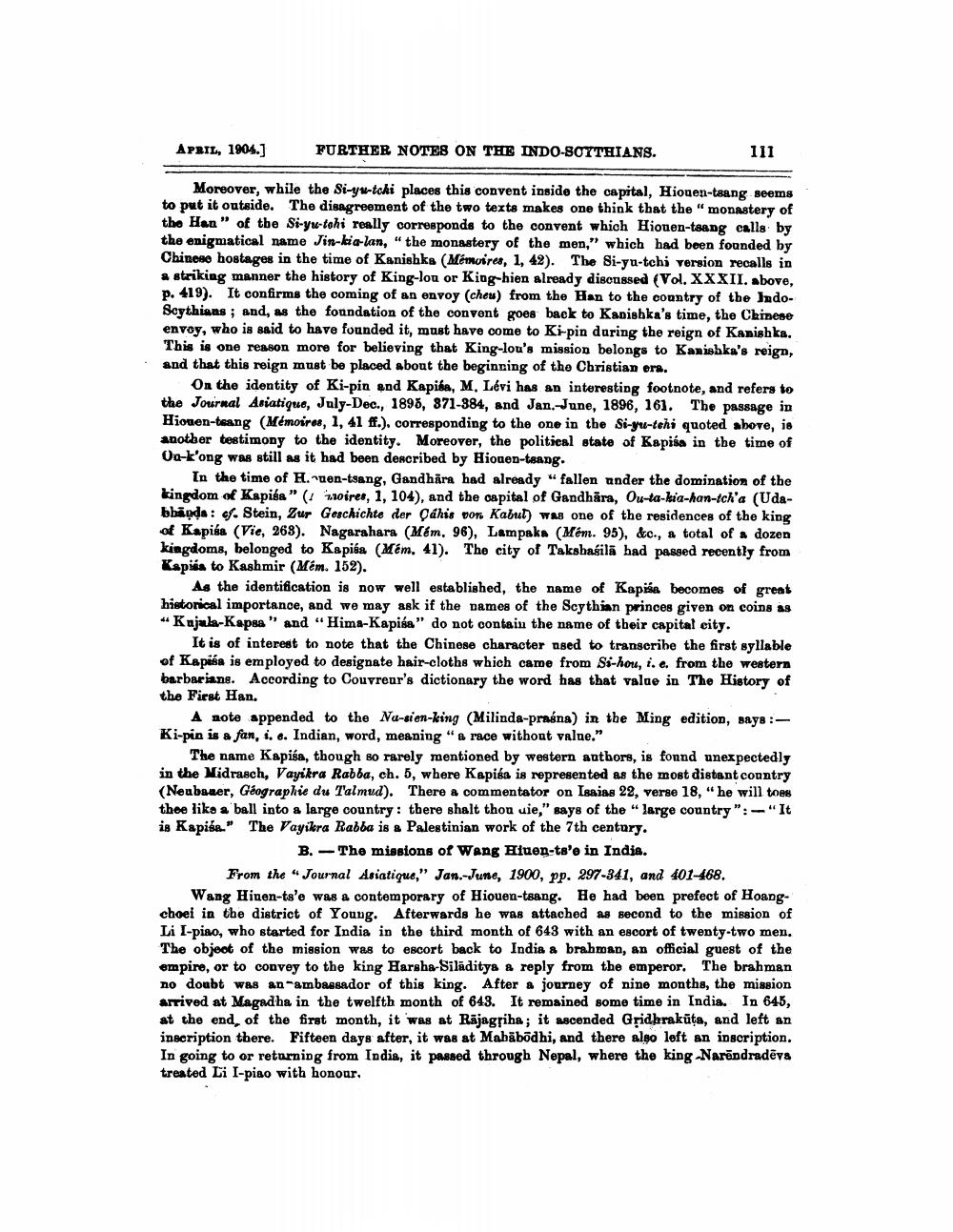________________
APRIL, 1904.]
PURTHER NOTES ON THE INDO-SOYTHIANS.
111
Moreover, while the Si-yu-toki places this convent inside the capital, Hiogen-tsang seems to put it outside. The disagreement of the two texts makes one think that the "monastery of the Hen" of the Si-yu-tohi really corresponds to the convent which Hiouen-tsang calls by the enigmatical name Jin-kia-lan, “the monastery of the men," which had been founded by Chinese hostages in the time of Kanishks (Mémoires, 1, 42). The Si-yu-tchi version recalls in a striking manner the history of King-lou or King-hien already discussed (Vol. XXXII. above, p. 419). It confirms the coming of an envoy (cheu) from the Han to the country of the IndoScythians; and, as the foundation of the convent goes back to Kanishka's time, the Chinese envoy, who is said to have founded it, must have come to Ki-pin during the reign of Kanishka. This is one reason more for believing that King-lou's mission belongs to Kanishka's reign, and that this reign must be placed about the beginning of the Christian era.
On the identity of Ki-pin and Kapiba, M. Lévi has an interesting footnote, and refers to the Journal Asiatique, July-Dec., 1898, 871-384, and Jan.-June, 1896, 16). The passage in Hionen-tesng (Mémoires, 1, 41 ff.), corresponding to the one in the Si-yu-tehi quoted above, is another testimony to the identity. Moreover, the political state of Kapisa in the time of Oo-k'ong was still as it had been described by Hionen-tsang.
In the time of H. uen-tsang, Gandhara had already "fallen under the domination of the kingdom of Kapiba" (1 noires, 1, 104), and the capital of Gandhära, 04-ta-kia-han-tch'a (Udabbads: cf. Stein, Zur Geschichte der Páhis por Kabut) was one of the residences of the king of Kapisa (Vie, 268). Nagarahara (Mém. 96), Lampaka (Mén. 95), &c., a total of a dozen kingdoms, belonged to Kapisa (Mém. 41). The city of Taksbasilā had passed recently from Kspiss to Kashmir (Mém. 152).
As the identification is now well established, the name of Kapisa becomes of great historical importance, and we may ask if the names of the Scythian princes given on coins as * Kajala-Kapsa" and "Hima-Kapisa" do not contain the name of their capital city.
It is of interest to note that the Chinese character used to transcribe the first syllable of Kapaśa is employed to designate hair-cloths which came from Si-hou, i.e. from the western barbarians. According to Couvreur's dictionary the word has that value in The History of the First Han.
A note appended to the Nu-sien-king (Milinda-praśna) in the Ming edition, saya :Ki-pin is a fan, I. o. Indian, word, meaning "a race without value."
The name Kapisa, though so rarely mentioned by western anthors, is fonnd unexpectedly in the Midrasch, Vayikra Rabba, ch. 5, where Kapisa is represented as the most distant country (Neubaaer, Géographie du Talmud). There a commentator on Isaias 22, verse 18, "he will toes thee like a ball into a large country: there shalt thou uie," says of the large country": "It is Kapis." The Vayikra Rabba is a Palestinian work of the 7th century.
B. The missions of Wang Hluon-ts'e in India. From the " Journal Asiatique," Jan.-June, 1900, pp. 297-341, and 401-468. Wang Hinen-ts'e was a contemporary of Hiouen-tsang. He had been prefect of Hoangchoei in the district of Young. Afterwards he was attached as second to the mission of Li l-piao, who started for India in the third month of 643 with an escort of twenty-two men. The objeot of the mission was to escort back to India a brahman, an official guest of the empire, or to convey to the king Harsha-Silāditys & reply from the emperor, The brahman no doubt was an ambassador of this king. After a journey of nine months, the mission arrived at Magadha in the twelfth month of 643. It remained some time in India. In 645, at the end, of the first month, it was at Rajagriha; it ascended Gridhrakūta, and left an inscription there. Fifteen days after, it was at Mabābõdhi, and there also left an inscription. In going to or returning from India, it passed through Nepal, where the king -Narindradēvs treated Li l-piao with honour,




